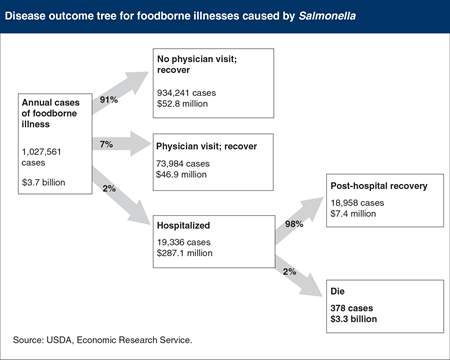You’re feeling queasy, your forehead is clammy, and all that tea you’ve been mainlining is doing nothing at all to perk you back up. What happens next is why it’s so hard to know if you had food poisoning or just a brush with the flu.
There are 48 million cases of food poisoning in the US a year, meaning that an estimated 1 in 6 Americans will get sick from something they ate.
However, although people are quick to self-identify food poisoning, very few cases actually get confirmed. Consider this example the USDA put together, breaking down how they came to their conclusions about the prevalence of Salmonella, the most commonly identified cause of food poisoning, in the last year:

Of the over 1 million cases estimated in the US, fewer than 1/10 were actually treated and confirmed.
So what does this mean in terms of what we know about food poisoning? It means that, data on food poisoning almost always comes from working backwards from the few cases that actually do get treated — which makes getting accurate figures in real time for both the total and individual pathogens that are making people sick very tricky.
Of course, once someone is actually being treated, figuring out if they have a foodborne illness (and exactly which one it is that is making them so miserable) is fairly simple. But the vast majority of food poisoning cases never get that far.
Top image: neil langan / shutterstock
